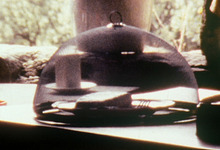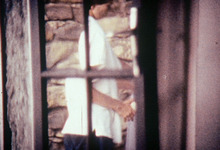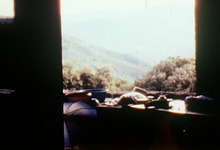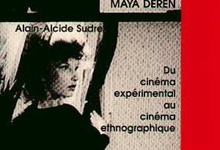Letter to Alain-Alcide Sudre (1940-2025) by yann beauvais
Alain, this time you have left us for good. Your passing marks the end of an era that had witnessed, since the end of the 1970s and the beginning of the 1980s, the birth of new generations of filmmakers, whom you frequently engaged in dialogue as part of your critical work and for the benefit of their creative development.
Together with Rose Lowder, you began showing films in Avignon at the end of the 1970s, initially with the goal of giving filmmakers the possibility to meet each other and discuss their own work and the specificity of the experimental film scene. You had just discovered experimental cinema in 1975, after having been a film critic for a Catholic student journal.1 In the summer of 1977, the two of you invited Collectif Jeune Cinema and the Coopérative des Cinéastes to present all their films in Avignon; in 1979, you put on the conference Cinéma des années 80 aux années 20 (Cinema from the 1980s to the 1920s) with the Paris Film Coop. These events were organized by Préa, which would later blossom into Archives du Film Expérimental d'Avignon, setting a precedent that assured that the newly-created organization was not limited to collecting films – in itself an innovative practice for its time, notwithstanding the institutional environment of cinematheques and contemporary art museums – but would also show to them and, above all, constitute, in your own words, a research tool instead of a simple cinematheque: our film acquisition policy differed in this from a good number of foreign equivalents. Where there exist initiatives similar to ours, though most of them were created much later, they usually stop at collecting films (and videos) without linking this activity to the archiving of paper documents that, as they deal with the same practices, will be of interest for future researchers in this field.2
You gave impetus to the idea of creating a collection and took the first steps toward transforming Préa into an organization that would become one of the first experimental film collections outside of the capital, one that was run by a filmmaker and a scholar. These efforts to create a space were undertaken alongside your teaching activity, as well as your writing and your numerous translations of texts by British filmmakers and, later on, American ones, in order to introduce the French public to these fundamental writings to which they previously had no access in their own language. You were one of the two translators of A Perspective on English Avant-Garde Film (1978), which presented a panorama of British experimental cinema of the 1960s and 1970s that was rich both in film works and in theoretical advances challenging the American perception or conception of avant-garde cinema. Thus, more so than the American structural film, British cinema insists on the reflexive nature of an approach in which the spectator cannot remain in the passive, admiring attitude that is proper to catharsis. In order to do this, in films such as Room Film (1973), Gidal opts for images at the threshhold of the identifiable, without allowing spectators the possibility to orient themselves in a circumscribed space.3 The importance of this work has not been justly recognized, just as your critical writings on the various movements of experimental cinema.
When we founded Light Cone, you and Rose supported the emergence of this new cooperative, often sharing with us your writings which we would publish in the Scratch journal. But even earlier, you were without a doubt one of the first people who encouraged me to write by accepting to be an attentive and rigorous reader of my first texts, which were in need of a bit more than just stylistic advice. Through the archive, you organized a series of artist talks and interviews with filmmakers, which allowed them to elucidate their works; I remember particularly your interviews with Jakobois and Vivian Ostrovsky. It's impossible to enumerate them all, as you would constantly turn your gaze to French filmmakers, believing that their works hadn't received proper attention abroad. You saw this as an injustice to be corrected, as when you pointed out the too-frequent exclusion of Rose Lowder from film programs.
Your work was thus articulated around your wish to reestablish, or more precisely to bring to light, the specificities of various cinematographic inquiries, whether British, Canadian, or those closer to home: Rose Lowder's, my own, Jakobois' (November 19844)... As tenacious as these incessant efforts to reestablish things may have appeared, they were always accompanied by a sense of humor. I remember how the figure of the ugly black duckling was ridiculed in your response to Dominique Noguez's article on experimental cinema.5 You defined experimental cinema as an ensemble of exploratory practices that require the elaboration of an autonomous filmic thought.6
For you, sociological and theoretical approaches to experimental cinema went hand-in-hand, whether writing about the avant-gardes of the 1920s or 1930s, British materialist cinema, or the particularities of Rose Lowder's theoretical work on film. Indeed, as you remarked in an interview7, I had chosen film criticism over film theory, whereas for you, the latter seemed crucial, not only to situate oneself within cinema history, but above all, to mark the differences and specificities of each filmmaker's practice. In this regard, your loyalty to the work of your partner, Rose Lowder, was exemplary, since it consisted in establishing, over the course of many articles, the singularity of her work – not only in a technical sense, but also when it came to her ecological activism. I remember, for instance, the article "Le film expérimental: un autre regard sur l'histoire" ("Experimental Film: Another Gaze on History")8, but many more can be cited where you brilliantly defended this work.
When you finished your doctoral dissertation Dialogues critiques avec Maya Deren: Du cinéma expérimental au cinéma ethnologique9 (Critical Dialogues with Maya Deren: From experimental film to ethnological cinema), we hoped that you would obtain a teaching position at a French university, but due to the caste-like system in French academia, it took some time for you to be hired by Paul Valéry University in Montpellier. It's a shame that it didn't happen sooner, because your teaching would have opened the way for different approaches to the subject that would be unlike the common tendency to turn experimental cinema into just another area of expertise.
The publication of your book came too late; your dissertation had been defended in 1991. It made it possible for the French public to discover many of the filmmaker's theoretical, in addition to giving access to numerous translations of critical texts from the book by the Anthology Film Archives, The Legend of Maya Deren. Your dissertation illuminated various issues related to Maya Deren's thought, non only in relation to avant-garde cinema, but also to the condition of a female artist who had to create the space within which she could receive recognition. Your dual approach that included both an explanation and a promotion of her films and writings allowed the reader to understand how she had moved from political activism to artistic radicalism, later becoming an artist-priestess. The uniqueness of her approach, the breadth of the changes undergone by the filmmaker can be said to precede, in a certain way, the work of Rose Lowder: While Rose Lowder, working in the field of visual research which interests her, conceives of her films as instruments of inquiry, a cognitive and heuristic activity of which art is both the goal and the means, Maya Deren conceived of hers not only from a conceptual point of view, but also saw them as a form of creation that maintained its connection to the imaginary and the senses (Ferdinand Alquié's "affective conscience"), culminating in the quasi-religious character of the ritual film.10
You and Rose also supported the various projects that we initiated, whether they were thematic programs such as Musique Film or endeavors like Mot : dites, images, where your contribution was crucial, especially in the publication of the catalogue Mot : dites, images.11 You not only wrote the text "L'Écriture comme matériau filmique" ("Writing as Filmic Material") for this catalogue, but also supervised and revised other texts and translated Scott McDonald's article, at a time when I had to take a step back after the passing of my father, which happened during the elaboration of the program and the writing of the texts. An important addition that resonated with your contributions to Musique Film12, in which your many translations of American and German filmmakers are of essential value.
To close, I would like to bring up other traits of your character that have less to do with cinema than with a certain conviviality. I cannot help but recall your love of food and the pleasure you took in devouring desserts and other treats, unabated even when your health began to mandate a stricter diet. When our meetings took place at restaurants, even as this became less frequent in recent years after my move to Brazil, we always made sure to order a dessert that you loved or wanted to try.
A feeling of regret lingers that I hope will cease when an anthology of your texts from the 1980s and 1990s, which are dispersed in various journals and catalogues, will finally be published. Your way of tackling the experimental cinema practice was unique in comparison to the French film criticism of those years. It sprang from your great knowledge of the theoretical questions related to artistic practice, and it deserves to be more accessible. In any case, thank you, Alain, for everything you have done for us all.
yann beauvais
Recife, April 2025
1. William English, "Three aspects of French Experimental Films: Interview with yann beauvais, Rose Lowder and Alain Alcide Sudre", in Millenium Film Journal n° 22-23, New York, Winter 1990-91, p. 113.
2. Alain Alcide Sudre, "1976-2002. De Préa aux Afea : Inventaire chronographique de 25 ans de programmation et d’archivage pour la défense du film comme art visuel", in L’image en mouvement, 25 ans d’activité pour la défense du cinéma comme art visuel, Afea, Avignon 2002.
3. Alain Alcide Sudre, "Structurel (Film)", in Alain et Odette Virmaux (eds.), Dictionnaire du cinéma mondial : mouvements, écoles, courants, tendances et genres, Éditions du Rocher, Monaco, 1994, p. 340.
4. Published in Scratch Revue n° 6, January 1985.
5. See "Le Nouveau Roman de Canard, about Le cinéma expérimental by Dominique Noguez" in Le Cinéma edited by Claude Beylie and Philippe Carcassonne, Scratch Revue n° 4/5, Paris, April 1984, pp. 113-117.
6. Alain Alcide Sudre, "Pour une pratique exploratoire" in La part du visuel : films expérimentaux canadiens, Avignon 1991, p. 56.
7. "Le cinéma décadré", yann beauvais, edited by Yung Hao Liu, Y2K Reforme What, Tresor Co & Chinkel-Graff Co, Taipei 1999, p. 51.
8. In Vertigo n° 16, "Face à l’histoire", Jean Michel Place, Paris 1997, pp. 171-179.
9. Published by l’Harmattan in the collection Champs Visuels, Paris 1996.
10. Alain-Alcide Sudre, Dialogues théoriques avec Maya Deren, L’Harmattan, Paris 1996, p. 241.
11. Mot : dites, Images, edited by yann beauvais and Miles McKane, Scratch / Centre Georges Pompidou, Paris 1988.
12. Musique film, edited by yann beauvais and Deke Dusinberre, Scratch / La Cinémathèque française, Paris 1986.




